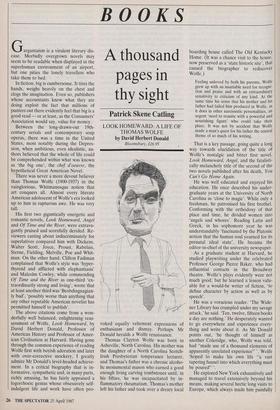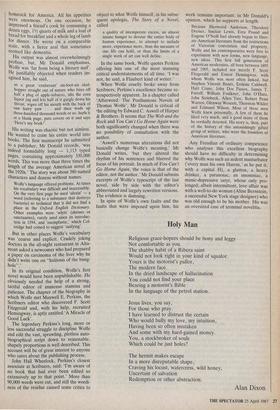BOOKS
A thousand pages in thy sight
Patrick Skene Catling
LOOK HOMEWARD: A LIFE OF THOMAS WOLFE by David Herbert Donald
Bloomsbury, £16.95
Gargantuism is a virulent literary dis- ease. Morbidly overgrown novels may seem to be readable when displayed in the superhuman environment of an airport, but one pities the lonely travellers who take them to bed.
In fiction, big is cumbersome. It tires the hands, weighs heavily on the chest and clogs the imagination. Even so, publishers whose accountants know what they are doing exploit the fact that millions of punters out there evidently feel that big is a good read — or at least, as the Consumers' Association would say, value for money.
Between the long-drawn-out 19th- century serials and contemporary soap operas, there was a time in the United States, most notably during the Depres- sion, when ambitious, even idealistic, au- thors believed that the whole of life could be comprehended within what was known as 'the big one', the chef d'oeuvre, the hypothetical Great American Novel.
There was never a more devout believer than Thomas Wolfe (1900-1937) in the vainglorious, Whitmanesque notion that art conquers all. Almost every literate American adolescent of Wolfe's era looked up to him in rapturous awe. He was very tall.
His first two gigantically energetic and romantic novels, Look Homeward, Angel and Of Time and the River, were extrava- gantly praised and scornfully derided. Re- viewers casting about indiscriminately for superlatives compared him with Dickens, Walter Scott, Joyce, Proust, Rabelais, Sterne, Fielding, Melville, Poe and Whit- man. On the other hand, Clifton Fadiman complained that Wolfe's style was 'hyper- thyroid and afflicted with elephantiasis' and Malcolm Cowley, while commending Of Time and the River as one-third 'ex- traordinarily strong and living', wrote that at least another third was 'Brobdingnagian- ly bad', 'possibly worse than anything that any other reputable American novelist has permitted himself to publish'.
The above citations come from a won- derfully well balanced, enlightening reas- sessment of Wolfe, Look Homeward, by David Herbert Donald, Professor of American History and Professor of Amer- ican Civilisation at Harvard. Having gone through the common experience of reading Wolfe first with boyish adoration and later with over-corrective mockery, I greatly admire Mr Donald's level-headed achieve- ment. In a critical biography that is in- formative, sympathetic and, in many parts, richly amusing, he has fairly appraised a logorrhoeic genius whose obsessively self- indulgent life and work have often pro- yoked equally vehement expressions of enthusiasm and dismay. Perhaps Mr Donald heralds a Wolfe renaissance.
Thomas Clayton Wolfe was born in Asheville, North Carolina. His mother was the daughter of a North Carolina Scotch- Irish Presbyterian temperance lecturer, and Thomas's father was a chronic alcoho- lic monumental mason who earned a good enough living carving tombstones until, in his fifties, he was incapacitated by in- flammatory rheumatism. Thomas's mother left his father and took over a dreary local boarding house called The Old Kentucky Home. (It was a chance visit to the house, now preserved as a 'state historic site', that caused the biographer to rediscover Wolfe.) Feeling unloved by both his parents, Wolfe grew up with an insatiable need for recogni- tion and praise and with an extraordinary sensitivity to criticism of any kind. At the same time his sense that his mother and his father had failed him produced in Wolfe, as it does in other narcissistic personalities, an urgent 'need to reunite with a powerful and nourishing figure' who could take their place. It was not by accident that Wolfe made a man's quest for his father the central theme of so much of his writing.
That is a key passage, going quite a long way towards elucidation of the title of Wolfe's nostalgic and bitter first novel, Look Homeward, Angel, and the fatalisti- cally melancholy title of the second of the two novels published after his death, You Can't Go Home Again.
He was well educated and enjoyed his education. He once described his under- graduate years at the University of North Carolina as 'close to magic'. While only a freshman, he patronised his first brothel. Conforming with the orthodoxy of that place and time, he divided women into `angels and whores'. Reading Latin and Greek, in his sophomore year he was understandably 'fascinated by the Platonic notion that the human soul yearned for its prenatal ideal state'. He became the editor-in-chief of the university newspaper.
As a graduate student at Harvard, he studied playwriting under the celebrated Professor George Pierce Baker, who had influential contacts in the Broadway theatre. Wolfe's plays evidently were not much good, but he learned a lesson valu- able for a would-be writer of fiction, 'to define character by action as well as by speech'.
He was a voracious reader. 'The Wide- ner Library has crumpled under my savage attack,' he said. 'Ten, twelve, fifteen books a day are nothing.' He desperately wanted to go everywhere and experience every- thing and write about it. As Mr Donald points out, 'he thought of himself as another Coleridge, who, Wolfe was told, had "made use of a thousand elements of apparently unrelated experience" '. Wolfe 'hoped to make his own life "a vast tapering funnel into which everything must be poured" '.
He explored New York exhaustively and managed to travel extensively beyond his means, making several hectic long visits to Europe, which always made him painfully homesick for America. All his appetites were enormous. On one occasion, he impressed a friend's cook by consuming a dozen eggs, 11/2 quarts of milk and a loaf of bread for breakfast and a whole leg of lamb for dinner. He wrote on a comparable scale, with a fierce zeal that sometimes seemed like dementia.
His output was almost overwhelmingly profuse, but, Mr Donald emphasises, Wolfe was 'far from being a literary nail'. He justifiably objected when readers im- agined him, he said,
as a great 'exuberant' six-foot-six clod- hopper straight out of nature who bites off half a plug of apple-tobacco, tilts the corn liquor jug and lets half of it gurgle down his throat, wipes off his mouth with the back of one hairy paw . . . and then wads up three-hundred thousand words or so, hurls it at a blank page, puts covers on it and says `Here's my book!'
His writing was chaotic but not aimless. He wanted to cram his entire world into books. The first manuscript he submitted to a publisher, Mr Donald records, 'was indeed formidably long — 1,113 typed pages, containing approximately 330,000 words. This was more than three times the length of the average American novel of the 1920s.' The story was about 380 named characters and dozens without names.
Wolfe's language offered problems. At times his vocabulary was difficult and inaccessible. On the very first page he used 'alexin' — a word (referring to a substance that destroys bacteria) so technical that it did not find a place in the Oxford English Dictionary. Other examples were `adyts' (shrines or sanctuaries), rarely used since its introduc- tion in 1594, and 'esemplastic,' which Col- eridge had coined to suggest 'unifying'.
But in other places Wolfe's vocabulary was 'coarse and explicit. Crudely joking doctors in the all-night restaurant in Alta- mont asked a newcomer who had prepared a paper on carcinoma of the liver why he didn't write one on "halitosis of the bung- hole".'
In its original condition, Wolfe's first novel would have been unpublishable. He obviously needed the help of a strong, tactful editor of immense stamina and patience. The chapter of the biography in which Wolfe met Maxwell E. Perkins, the Scribners editor who discovered F. Scott Fitzgerald and, with his help, recruited Hemingway, is aptly entitled 'A Miracle of Good Luck'.
The legendary Perkins's. long, more or less successful struggle to discipline Wolfe and edit the vast, sprawling, plotless auto- biographical script down to reasonable, shapely proportions is well described. This account will be of great interest to anyone who cares about the publishing process. John Hall Wheelock, Perkins's closest associate at Scribners, said: 'I'm aware of no book that had ever been edited so extensively up to that point.' More than 90,000 words were cut, and still the wordi- ness of the residue caused some critics to object to what Wolfe himself, in his subse- quent apologia, The Story of a Novel, called
a quality of intemperate excess, an almost insane hunger to devour the entire body of human experience, to attempt to include more, experience more, than the measure of one life can hold, or than the limits of a single work of art can well define.
In the same book, Wolfe quotes Perkins offering him one of the most stunning critical understatements of all time. 'I was not, he said, a Flaubert kind of writer.'
When Wolfe cruelly broke away from Scribners, Perkins's excellence became re- trospectively apparent. In a chapter called Afterword: The Posthumous Novels of Thomas Wolfe', Mr Donald is critical of the editing by Edward C. Aswell of Harper & Brothers. It seems that The Web and the Rock and You Can't Go Home Again were both significantly changed when there was no possibility of consultation with the author.
`Aswell's numerous alterations did not basically change Wolfe's meaning,' Mr Donald writes, 'but they altered the rhythm of his sentences and blurred the focus of his portrait. In much of You Can't Go Home Again, the voice is that of the editor, not the author.' Mr Donald submits excerpts of Wolfe's typescript of the last novel, side by side with the editor's abbreviated and largely rewritten versions. The evidence is damning.
In spite of Wolfe's own faults and the faults that were imposed upon him, his work remains important, in Mr Donald's opinion, which he supports at length:
Because Sherwood Anderson, Theodore Dreiser, Sinclair Lewis, Ezra Pound and Eugene O'Neill had already begun to liber- ate American literature from the restrictions of Victorian convention and propriety, Wolfe and his contemporaries were free to experiment with new forms, new language, new ideas. This first full generation of American modernists, all born between 1895 and 1905, included not merely F. Scott Fitzgerald and Ernest Hemingway, with whom Wolfe was most often linked, but Stephen Vincent Benet, Erskine Caldwell, Hart Crane, John Dos Passos, James T. Farrell, William Faulkner, John O'Hara, John Steinbeck, Allen Tate, Robert Penn Warren, Glenway Wescott, Thornton Wilder and Edmund Wilson. Most of these men Wolfe knew personally. A few of them he liked very much, and a good many of them he cordially detested. His story is, then, part of the history of this astonishingly gifted group of writers, who were the founders of American literature.
Any Freudian of ordinary competence who analyses this excellent biography should have no difficulty in determining why Wolfe was such an ardent masturbator (`every man his own Harem,' as he put it, with a capital H), a glutton, a heavy drinker, a paranoiac, an insomniac, a manic-depressive satyr, whose only pro- longed, albeit intermittent, love affair was with a well-to-do woman (Aline Bernstein, a successful New York stage designer) who was old enough to be his mother. His was an oversized case of terminal novelitis.



































































 Previous page
Previous page